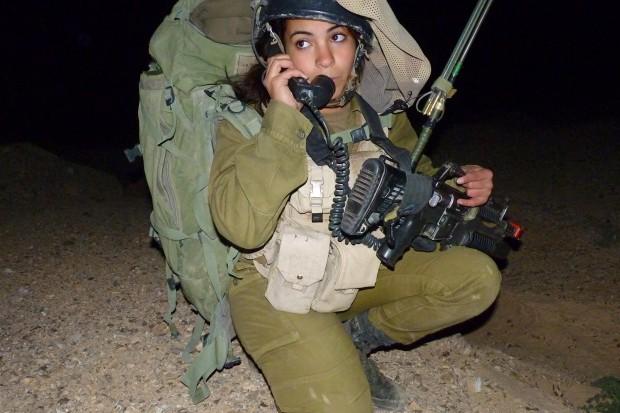IDF Women Warriors: A Model for US Women in Uniform
The all-women “Nachshol” company was formed in 2006. (Photo: Matthew Bell)
When the Pentagon moved to lift the ban on women, in many ways it was a case of the regulations catching up to reality. Around 300,000 US servicewomen have served in the wars in Afghanistan and Iraq. More than 150 have lost their lives in those conflicts with no clear delineation of where the front lines lie.
One country with longer experience of allowing women to serve in combat roles is Israel. More than a decade ago, the Israel Defense Forces started lifting restrictions for would-be female warriors.
It's about midnight on a rocky hillside in southern Israel, next the border with Egypt. Suddenly, a suspected illegal migrant who has likely crossed from the Sinai desert runs into an Israeli army patrol.
"Who are you and what are you doing here," an Israeli soldier shouts. "Take the pants off!"
"But I'm cold," the migrant complains.
"I don't care! Take the pants off now!"
A squad of IDF soldiers point their assault rifles and order the migrant to strip in the chilly desert air. What follows, is some uncontrollable giggling. Because this is just a drill. And all the participants, including the unidentified intruder, are part of the same IDF unit.
The soldiers taking part in this all-night training exercise are members of the Israeli army's only all-female combat intelligence company. It's called "Nachshol," which means "tidal wave" in Hebrew. Essentially, their job is to go out into the desert and sit — for days at a time — and just watch the border with Egypt.
"Basically, we need to bring from the field the best intelligence," says Captain Dana Ben-Ezra, the company commander of Nachshol. At 28, she's already a 10-year army veteran. Ben-Ezra says the company's job is collect information, "without anyone knowing we're there. Not even our own forces."
When I ask her why the army has assigned women to this particular job, Ben-Ezra says, "no offense, but they're just more intelligent."
"More patient, more common sense, you know?"
"[Men] are more aggressive, you know how to scream," Ben-Ezra says. "We know how to do the job."
This company's job involves a lot sitting still, peering into binoculars or night-vision equipment and simply observing. The IDF has apparently decided that women are better at this kind of work. The unit was formed in 2006, also out of practical concerns. The soldiers spend long hours sitting or lying down in mobile observation posts that they construct themselves. That means doing things like going to the bathroom in front of one's comrades.
The IDF has not always allowed women to join combat units.
In 1995, an Israeli pilot named Alice Miller took the air force to court for denying her the chance to become a military pilot. She won the case. And since then, more combat-related jobs have been opened up for women in the Israeli military.
Now, women can try out for 90 percent of all military professions. Special forces and commando units are still off-limits. But women make up about 4 percent of Israel's combat forces, according to the military. There's a potential problem here, says Major Judith Webb. She was the first woman to command an all-male squadron in the British army.
"What I'm talking about is women in the infantry," Webb told the BBC. "I don't feel that women have the physical capability of fulfilling an infantry role. I'm not talking about the emotional or psychological or any of those effects, or what effects it may have on men. I'm talking about the physical limitations."
Abby Chernick does not agree. The 23-year-old grew up in the northeastern US. She took citizenship in Israel after college and then signed up for an extra year of combat service, instead of taking on the kind of less-dangerous and physically demanding role sought out by many women in the Israeli military.
Chernick scoffs at the idea that women should be banned from combat roles in Israel or anywhere else.
"Just a couple months ago," she tells me during the training mission, "a female combat soldier in the same area that we're in actually, she shot and killed a terrorist who had come through the fence and was firing on Israeli troops."
Chernick says, "women have already proved themselves in [military] service in America. And the fact [is] that more women, many, many more women have died in service in America's army than in Israel's."
The US and Israeli militaries are very different in a lot of ways. Israel is the only nation that has mandatory military service for both men and women. Though about half of all Jewish women in Israel do not serve in the military, with many opting to receive a deferment on religious grounds.
Every day, reporters and producers at The World are hard at work bringing you human-centered news from across the globe. But we can’t do it without you. We need your support to ensure we can continue this work for another year.
Make a gift today, and you’ll help us unlock a matching gift of $67,000!
